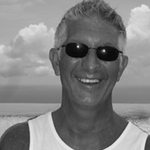EDITOR'S NOTE
atlanta, GA | august 31, 2009
For good or ill, I never think of place as being solely geographical.
My sense of place isn’t bound by rivers or interstate highways or shadowed by mountains or skyscrapers. It’s far more encompassing, far more complicated, far more abstract (and concrete) than that. Place reaches from the geographical to the mental (from soybean fields to πr2), from the mental to the spiritual (from Sartre’s claustrophobic room to an amoeba, a cell), from the spiritual (nirvanah, the Boa tree, the site of Mohammed’s ascension, the west wall) back again to the geographical (the sun sizzling Santurce as pelicans glide overhead, the Coliseum full of lions and tigers and bears, and Chelsea, where boys come and go drooling over Michelangelo’s David strutting only steps ahead).
Place-mind-spirit-place: a loop-the-loop we’re all caught up in or enchanted by whether we realize it or not, whether we want to be or not, a moebiüs strip we call, finally, even bravely, imagination—and gasp, our breath catching in our throats over our hubris.
Similarly, I find it difficult to distinguish between my body and the shadow it casts across the linoleum on which it stands or the drizzle or sunshine through which it (somehow) travels or the sand on which it lounges, sipping martinis. There it goes la-de-dah across a delta or a sidewalk; across the prairie grass of the Midwest where I grew up or through the cityscape of New York City where I recently lived and left my heart; among the pine trees of Atlanta where I currently live or the crests of the waves along Condado in Puerto Rico, my adopted home where I spend summers.
Once upon a time, I looked into the Coliseum in Rome and suddenly, inexplicably, felt that—at last—I belonged somewhere, in this case history. Once in Lisbon, along the Costa del Sol, I thought an angel called my name, but it was only a boy making kissy noises at me. Once in Paris, I bought chocolate for my beloved in a shop where the clerk spoke only Spanish and Russian and I spoke English, a little Spanish, and even less Russian. We giggled a lot in a language with no grammar and made the sale without a hitch. Once in an art gallery in London, I sat having tea at the same table where Dianne Keaton sat, also sipping tea, but she also nibbled scones. (Which reminds me of the times I ran into Divine, Yoko Ono, the heavy-set guy from Manhattan Transfer—not the cute one—, Molly Ringwald, Paul Anka, Lynn Redgrave, Richard Thomas, Joan Rivers, James Earl Jones, and the grey-haired guy from Judging Amy. Which reminds me of the time Stephen Spender, recently knighted by QEII, caressed my ass as we were getting into a taxi in Chicago.) Once in Equador, I looked into a dead volcano and saw—it seemed miles below and maybe it was—a farm: the immaculate parallel rows of crops and a teensy farmer walking behind a teensy horse pulling a teensy plow.
Place is never simply itself.
Place is always something additional, something we bring to it: the way a trumpeter brings breath to the horn or a harpist’s fingers bring vibration to the strings. Air and movement. Song.
 JIM ELLEDGE’s H, a collection of prose poems about outsider artist Henry Darger, is due fall 2009. His A History of My Tattoo: A Poem won the 2006 Lambda Literary Award for gay male poetry and the Georgia Author of the Year in poetry award. It was also a finalist for the Thom Gunn Award for gay male poetry. His work has appeared in Paris Review, Jubilat, Five Fingers Review, Denver Quarterly, North American Review, and other journals. He directs the M.A. in Professional Writing Program at Kennesaw State University, the Writers Workshops of Puerto Rico, and Thorngate Road, a press for queer poets.
JIM ELLEDGE’s H, a collection of prose poems about outsider artist Henry Darger, is due fall 2009. His A History of My Tattoo: A Poem won the 2006 Lambda Literary Award for gay male poetry and the Georgia Author of the Year in poetry award. It was also a finalist for the Thom Gunn Award for gay male poetry. His work has appeared in Paris Review, Jubilat, Five Fingers Review, Denver Quarterly, North American Review, and other journals. He directs the M.A. in Professional Writing Program at Kennesaw State University, the Writers Workshops of Puerto Rico, and Thorngate Road, a press for queer poets.